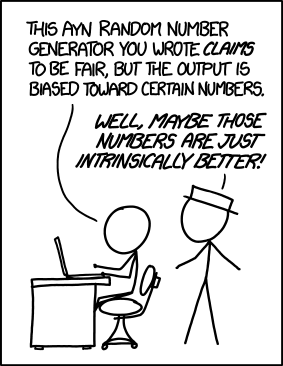I recently found an article interviewing Jonathan Haidt. It’s in the rather tedious “liberals are going too far and eliminating free speech” genre. I’m not going to address most of it, just this part (emphasis mine):
The left, meanwhile, has undergone an ideological transformation. A generation ago, social justice was understood as equality of treatment and opportunity: “If gay people don’t have to right to marry and you organize a protest to apply pressure to get them that right, that’s justice,” Mr. Haidt says. “If black people are getting discriminated against in hiring and you fight that, that’s justice.”
Today justice means equal outcomes. “There are two ideas now in the academic left that weren’t there 10 years ago,” he says. “One is that everyone is racist because of unconscious bias, and the other is that everything is racist because of systemic racism.” That makes justice impossible to achieve: “When you cross that line into insisting if there’s not equal outcomes then some people and some institutions and some systems are racist, sexist, then you’re setting yourself up for eternal conflict and injustice.”
Here’s the thing. Outcomes are a product of several things: opportunities provided by society, the abilities of the individuals, and random chance. I believe that people in these minority groups do not systematically have less inherent ability than people in the majority. So if we truly had equality of opportunity, I would expect that minority groups would also have equal outcomes, plus or minus some statistical noise.
Get that? If we have unequal outcomes above and beyond statistical noise, then we can infer unequal opportunities.
Haidt appears to believe that unequal outcomes do not imply unequal opportunities. I do not know why he believes this. Does he believe that Black and gay people systematically have less inherent ability? That’s my initial guess whenever someone draws a distinction between equal opportunities and equal outcomes.
Here’s another thing. There are some minority groups that do in fact have less, or different, ability. That’s what disabilities rights are about. And well, even when it does come down to personal abilities, we have to acknowledge that personal abilities come down to random chance. I find it morally repugnant to say that someone who, by random chance, has different abilities than me deserves less than me.
Finally, a brief comment on this part:
That makes justice impossible to achieve […] “you’re setting yourself up for eternal conflict and injustice.”
I get the sense that Haidt is the kind of person who only likes linear goal-oriented video games, and can’t grok the idea of a sandbox game.


Why don’t these people (and the trumpeters of “meritocracies”) just come out and say what they’re trying to subtext? They think straight white cis men are just superior to everyone else. If that’s who you see rising to the top, and you honestly believe you have a meritocracy, then you must think that they must be the best.
And of course this gets even more blatant when they talk about how any attempts to fix these “meritocracies” will only make everything worse.
I’m writing some blog posts about this kind of thing! Not sure I need to now though, you seem to have succinctly covered most or all of the main points I was thinking of 🙂
Also, about his “Eternal conflict and injustice” thing…doesn’t that sound suspiciously like the truism that perfection is impossible to ever reach? Yet we shouldn’t give up on trying to improve things…should we?
*and my thoughts on the subject weren’t even complete, so I still found your blog post enlightening 🙂
@Brian Pansky,
Thanks!
I do think there is a lot more that could be said about meritocracy and fairness. For example, opportunities are often what help us develop abilities.
@Siggy
haha, ya, like the irony of my resume: there isn’t much on it (partly) because no one hires you when there’s not much on it… my situation is a bit of a self-reinforcing state in several ways. My work history is one of the major ones.
*well, there is plenty of employment on my resume, it’s just not the kind that is relevant to engineering jobs…